Kategorie: ‘Barcelona’
Research stay in Barcelona
- Chemistry M.Sc.
- Spain, Barcelona
- Institute for Bioengineering of Catalonia
- 11/23 – 02/24
1: Application / Finding and internship
Before living in Germany I grew up in Spain and lived in a little city in the north of Catalonia until I was 8 years old. I always maintained a very good relationship with my friends and my family from this area and visited Spain multiple times per year. However, I always wanted to move back to my home country and experience the everyday life in Spain for another time period of my life.
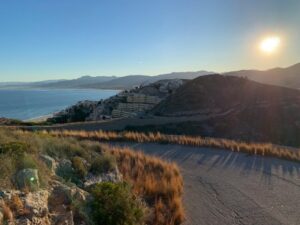
© Bastian Heib Navarro
During the Master studies of Chemistry at the RWTH Aachen, the students have to do two or three research internships. It is very common to do at least one of these internships abroad and thus I was presented with the perfect opportunity to fulfill my previously described wish. The supervisor of my Bachelors thesis put me in contact with a research group leader at the “Institute for Bioengineering of Catalonia”, which is a research institute located at the “Parc Científic de Barcelona”. The institute itself focusses on bioengineering and nanomedicine research and I found the specific research topics of the group I got in touch with, very appealing. After a few phone and zoom calls, I was offered a topic for the internship, and I happily accepted.
2: Accommodation and Living expenses
Finding a place to stay in Barcelona was not easy but manageable. The fact that I had to do it from Germany, did not turn out to be a problem in the end, as I was able to do the viewing of the room I ended up renting over a video call. I was lucky to find a place within 15 minutes walking distance from the institute. I lived in a shared apartment with three roommates. The apartment was equipped with everything necessary like a kitchen with an oven, a huge fridge and refrigerator and also a washing machine. My personal dormitory was outfitted with a bed, a wardrobe and a desk. Compared to rooms in Germany the room was rather small but personally it did not bother me at all, because I did not spend much time in the flat in the first place and I had a very good relationship with my roommates which led to us spending most of the time together in the kitchen and the living room. All my roommates where either from Spain or from South America, so we spoke in Spanish, which really contributed to the great feeling I gained from moving to Barcelona. The rent averaged 500 € per month which is rather expensive compared to a shared apartment in Aachen. Hower, these prizes are the standard in Barcelona and can be compared to the more expensive cities in Germany like Berlin, Hamburg or München.
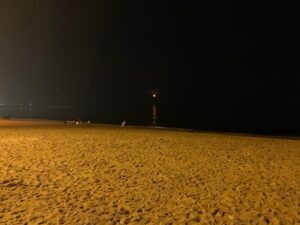
© Bastian Heib Navarro
I lived in a very favorable place, considering that I could easily walk to work every day. I had access to a metro station directly in front of my home and it took me 5 minutes to get to the main train station of Barcelona or 15 minutes to get to the city center. Despite the increased rent prizes, the living expenses are comparable, if not lower than in Germany. A metro or bus ticked that allows you to get to any destination in Barcelona rather fast cost around 1 €. Food and drinks at bars are also less expensive, which accompanies the very outgoing Spanish culture.
3: Everyday life / The internship
From my personal experience I always like to tell that the everyday life in Spain is just one or two hours postponed compared to the German lifestyle. Instead of starting work at 8 or 9 am, I mostly started to work at 10 am. Dinner is usually at around 9 pm and social get togethers during the evening do often start past 10 pm, even on normal working days.
My day usually began at around 8 am, as I liked to prepare my lunch for the day before going to work. During the workweek I spend most of the time at the institute as I worked until 7 or 8 pm most of the days. However, I really enjoyed staying there this long for several reasons.
First of all, the work I was inducted with, was extremely compelling and I was able to learn many new things. In the group I worked in I was the only one with a “pure” chemistry background, while my colleagues were chemical engineers, biomedical engineers, nanoscientist and so on. Thus, a very dynamic workflow was created with each p
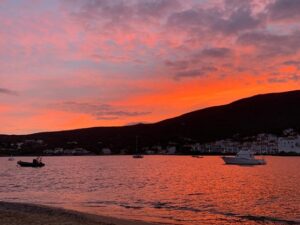
© Bastian Heib Navarro
erson contributing with their own scientific background. I enjoyed these interdisciplinary exchanges a lot, because you are presented with many different ideas that help you to think outside your box. The chemistry used for biomedical research was always a compelling topic, which I sadly found to be rather underrepresented during the Bachelors degree at the RWTH Aachen. Therefore, now I was presented with the opportunity to learn many new aspects of other scientific fields and to expand my way of scientific thinking.
During the internship I was presented with a lot of freedom regarding the work, and I also had more responsibilities than I´ve had as a researcher in Aachen. What I especially want to highlight is that in the group everybody was treated completely equal regardless of being a master student, PhD student or Post-Doc and all contributed to the work with the same amount of dedication and every opinion was valued the same.
However, what was much more important on a personal level was the great relationship I was able to establish with all of my working colleagues. We were a rather small and extremely international group, as 8 nationalities were represented within just 10 people. Thus, English was mostly used as work related language, but also many other languages were used along the day. I was introduced into a very funny and amusing environment, which let me to enjoy my working hours a lot. Of course, not much time was left at the end of the day to do many free time activities and sometimes the workload turned out to be quite intense and stressful. Nevertheless, I still found a good balance between working, but also doing sports and enjoying many meetups with friends during the evening hours.
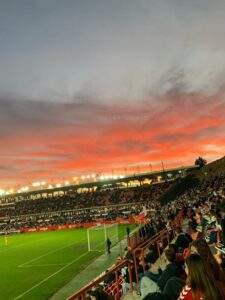
© Bastian Heib Navarro
4: Free time/tips
There are uncountable options and opportunities to spend your free time in Barcelona. The city is extremely international and offers possibilities to pursue almost any interest. Meeting at different bars and restaurants whenever time allowed became a personal favorite. I enjoyed watching many football matches with great company and atmosphere. Furthermore, Barcelona has a very high number of small international Cinemas, where you can watch movies from all around the world in their original language. Even though I stayed in Spain during the winter, the weather was still around 15-20 °C most of the time, which allowed me to spend a lot of my free time outside and at the beach. During December there were also many Christmas markets located all over the city, which provides one with many different artisanal food options and typical Spanish and Catalan Christmas decorations.
Additionally to everything that Barcelona has to offer on its own, the city is perfectly located to travel to many other beautiful cities to see even more of the Mediterranean Sea. I made many weekend trips to the Costa Brava, to Tarragona and to Valencia. In Tarragona I went to support the local football club Gimnástic de Tarragona. For anybody interested in football, this is a great opportunity learn a few things about Spanish fan culture and to see a beautiful professional football stadium in close proximity to the sea. As the team is currently playing in the third Spanish league, the tickets are very affordable.
If you don’t want to travel more than 45 minutes, there are also many little cities around Barcelona that are worth a visit like Vilanova or Sitges. I spend “Carnaval” in Sitges which I would highly recommend to anybody, but especially to German people just used to the German Karneval traditions.
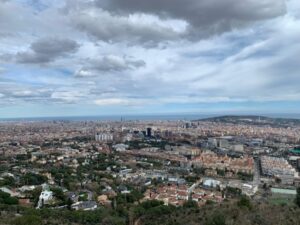
© Bastian Heib Navarro
5: Conclusions
I had already expectations from moving to Barcelona, as I fulfilled a dream I had since leaving Spain many years ago and I have to say that my experience even surpassed my expectations. I made a lot of progress workwise but also especially on a personal level. Securing the internship was rather easy and fast, so I had enough time to finish all the paperwork and to find an accommodation. There I was presented with a very nice living situation with great roommates. Most of the time was consumed by the internship itself, but I really enjoyed the working environment. The interdisciplinary exchanges with my colleagues and the responsibilities I was presented with, helped me to grow a lot on a professional level. Apart from science related work, I was able to fully enjoy the international diversity of my group and of the city in general, which brought me in touch with many engaging cultures.
I am grateful for the experiences I was allowed to make, and I personally can only recommend Barcelona as a city for an internship, as an incomparable contribution to your academic and professional journey is granted. The impact the internship had on was really life changing, as I enjoyed the stay here to the point, where I made an agreement with my group leader to do my master thesis and possibly my PhD here.
Kategorie: Allgemein, Barcelona, Chemistry, Spain
No Comments »
Writing a bachelor thesis in Barcelona
- Business Administration and Engineering: Mechanical Engineering B.Sc.
- Spain, Barcelona
- Universitat Politècnica de Catalunya
- 02/2023 – 06/2023
Finding an internship:
I started about 6 months in advance to search for an opportunity to write my Bachelor´s thesis abroad. I study industrial engineering (specializing in textile engineering) at RWTH Aachen. Through one of the plenty international contacts of the ITA, RWTHs textile institute, I was accepted as a research intern at the INTEXTER (textile institute at UPC university) in Barcelona. Officially, I was an intern there and not matriculated as a student at the university. In reality, I conducted the experiments for my bachelor thesis.
Accomodation and Living expenses:
Alright, listen carefully: the industrial engineering campus at UPC, where my institute was also located, is not really in Barcelona. It is in a small town nearby called Terrassa. From the city centre it is a 45 min train ride, so not too far away. The whole trip might take between 70-90 minutes in total, depending on how far away you live from the train station in Barcelona, if you decide to live in the city. I thought I would not have to go to the laboratory every day (little did I know…) so I decided to move to “l´Eixample “, one of the most beautiful and best neighborhoods to live in in Barcelona. I really enjoyed the location. Everything is built in squares here, each block has its own bakery and supermarket and the area is super walkable and has great public transport as well. Definitely recommend the area, even though it is a little more pricey than others!
My flat however, was a nightmare for me personally. I started searching for an apartment way too late because I had heard it was super easy to find a flat in Barcelona. Truth is: it is-but only if you are willing to pay super high prices! I ended up being forced to rent a room through an agency, that charged one month´s rent as a service fee and you could not even visit the flat before signing the contract. So I had to sign the contract and pay the service fee, the security deposit and the first month of rent (1800 euros) to get the key. It was either this or another month at the hostel, so I decided to take the risk. This was certainly not the smartest choice. I loved the location of the flat, but the flat itself was super dirty, filled with hardcore Erasmus students that treated the flat like an open air festival ground. It was the most disgusting place I ever lived in and had I visited the place before, I would have ran as far as I could. The price for a tiny room in a 7 bedroom flat with one shower was 600 euros. That´s why I would recommend starting to search early: Use apps like idealista and start at least three months in advance to find a decently priced accommodation in a good location because those do exist!
Now, at the end of my stay, I also do not know if I would choose to live in Barcelona when having to drive to Terrassa every day. I spent almost 3 hours commuting every day, on average 8 to 12 hours at the lab and then 1.5 hours at the gym. That meant that I literally had zero time during the week to take advantage of the nicely, very overprices location of my flat. Therefore, I recommend you to be sure you know exactly where you will be working or studying before you decide where you would like to live.
The highest expense was certainly my monthly rent. I signed up for a gym which was about 50 euros a month, way pricier than what I was used to from Aachen. I did not find a huge difference in the prices for groceries, going out could be really cheap or also super expensive so it really depended on where you went. What is super cheap at the moment is public transportation. If you are below 30 years old, you can buy a T-Joven ticket which allows you to take all sorts of public transport in 6 zones (about 1.5 hours outside of Barcelona) for about 40 euros for three months! I drive three zones every day to Terrassa, so without this discount ticket it would have been super expensive.
Everyday life / the internship:
Working at a textile/chemistry lab is very different from a German lab… The whole concept from a research institute is very different from what I was used to at the ITA. I do not want to go into too much detail, but here one of the core issues as an example: The laboratory did not have enough money to repair the AC, which lead to us doing experiments at 20 °C in spring and at 33 °C in summer. Are the results comparable? Of course not, I mean there are typical laboratory conditions for a reason, but you must find your way around it and be creative to find solutions for problems you would not expect to occur in a normal research laboratory. Even though the money issues were a great disadvantage for the research there, my laboratory had one huge advantage compared to other institutions: The world´s best and most dedicated professor you could imagine! The laboratory manager was a professor for chemical engineering and textile engineering at UPC. He managed the research lab on the side, receiving no extra money for it and having a lot more work and responsibility. He worked on the weekends to keep up with the workload and have time to meet about one hour with each of his students every week to guide their research. I am beyond thankful for how much time this professor invested into explaining basic chemistry to me (he convinced me to do experiments in a very chemical field even though I had not even basic chemistry knowledge), suggesting new areas of research and analyzing my results with me. With another supervisor who wasn´t that dedicated, I would have never managed to do these experiments. It was a very valuable but also exhausting experience, I am thankful to have had the chance to experience this.
Due to the rather long commute and the long hours, I spend at the lab, there was not much more for me to do during the week other than going to the gym.
Free time/tips:
My weekends I got to spend with some amazing friends I met during my first week when I went to Erasmus Events. I highly recommend visiting those gatherings at the beginning, because it is super easy to find friends from countries all over the world. I would go out for Brunch with them on Sundays (there are some amazing places in l´Eixample) and do some sightseeing and when it got warmer go to the beach or visit other beach cities on Costa Brava. If you are in Barcelona in February, go check out the carnival in Sitges, a small town 30 minutes by train from Barcelona. Blanes is also a beautiful beach town north of Barcelona, best visited in summer.
For anybody who loves to party, Barcelona is a dream. I did not go out much, but my flat mates went out at least 5 nights a week to different bars and nightclubs. It is also not too expensive, since every night there is a different club or bar with special offers. The ESN has an instagram channel that shares a lot of tips regarding parties and places to visit in Barcelona.
Conclusion:
I really enjoyed my time in Barcelona. The sun shines almost every day, it is a beautiful city and its by the sea – simply amazing. I could have enjoyed it more if I had studied as a regular Erasmus student and not dedicated so much time to my thesis, but if I had done it in Aachen I would not have spent my weekends at the beach so I can not complain. If you want to go to Barcelona to learn Spanish, it´s not the best idea. At the laboratory, I asked them to speak Spanish to me but they preferred to practice their English so I became their English teacher which was fine, but I ended up paying for private tutoring classes online to improve my Spanish because in my daily life I did not use more than hola and gracias and simple stuff to buy a sandwich at the bakery.. In Barcelona, everyone speaks English. At restaurants I would try to order in Spanish but they would automatically switch to English sometimes. So do not worry if you don´t speak Spanish and want to live here, it is really not necessary. In Terrassa, however, people would talk Catalan with me, which was kind of difficult to understand since it is a mix of Spanish, French and Italian.
Kategorie: Barcelona, Business Administration and Engineering, Mechanical Engineering, Spain
No Comments »
A great time in Barcelona
- Empirical Educational Research M.A.
- Spain, Barcelona
- Universitat de Barcelona
- 11.04.-24.06.2022
My experiences:
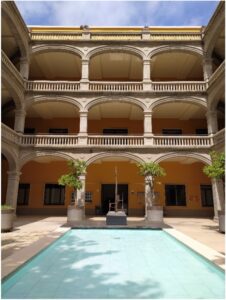
© Caroline Scherer
Since I’ve wanted to go abroad during my time at university for a long time, I decided to look for possibilities to do an internship abroad. To find a hosting organization, I did some online research on my own to look especially for research groups, since that was the area I was most interested to work in. That is how I found a research group at the University of Barcelona with a focus on intercultural educational research. I sent them a very formal application via email and quickly received a rather informal response, saying that the group would like to welcome me for an internship. The organization beforehand was a bit difficult – although I was in contact with the professor who would be my supervisor since November, it took a long time until my learning agreement was signed. For a long time I was not sure if my internship would actually happen and I barely managed to hand in the application for the ERASMUS+-Scholarship in time.
Because I only knew about six weeks in advance that I would really go to Barcelona, I did not have much time to look for accommodation, but I have heard from other people that it’s not unusual in Spain to look for shared flats etc. just a few weeks before moving in. Since I was busy with deadlines for essays and didn’t have much time to organize accommodation, I contacted BCN-Nest, an agency specialized on finding accommodation for international students. BCN-Nest charges a commission fee which for me was worth paying because this way I did not have any more trouble finding a room in Barcelona and I felt it was a relatively risk-free option. After sending in a short questionnaire on my wishes for the accommodation, I had a video-call with one of the consultants who then sent me detailed information on one possible option. My wish was to live with a host family to have the chance to practice my Spanish skills, and I got placed with a middle-aged woman and her young daughter with whom I could set up a video-call to get to know each other a little bit before agreeing to live there.
I decided to go to Barcelona by train, the fastest connection from Aachen takes about 12 hours. After my arrival, a consultant of BNC-Nest went with me to my host’s apartment to make sure everything was in order. All in all, I was very happy with my living situation. I lived in Grácia, which is considered to be one of Barcelona’s most beautiful districts with many small shops and a lively neighbourhood. The room I rented was definitely not the cheapest option, but considering the great location and the nice apartment, the rent was completely reasonable – utilities, wifi etc. were also included in the price and I was provided towels and bedsheets, so I really didn’t have to worry about anything regarding the apartment. I also could use the washing machine as well as the kitchen tools. Because of different working schedules I could not spend as much time with my host family as I would have wished to, but we got along very well and it was definitely an advantage to have a local to talk to. Because I didn’t stay for more than three months, I didn’t have to go to the registration office. Besides the rent, my living costs were similar to Germany. I usually went to Mercadona or Lidl to buy groceries, those were some of the cheapest grocery stores. In restaurant the prices depend a lot on the part of the city – in touristic areas it’s expensive, but in other districts the prices are comparable to Germany. I didn’t open a bank account in Spain because of my short stay. Withdrawing money from my German bank account was relatively expensive (about 5€), but in my experience you don’t need a lot of cash in Spain because you can pay with your bank card almost everywhere.
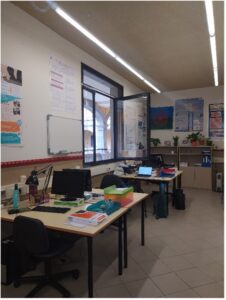
© Caroline Scherer
My way to work was relatively short, there was a metro station just five minutes away from my apartment, which connected me directly with the university campus where my office was. On usual days I worked in the office of the research group which I shared with a doctoral student and sometimes other researchers of the group. My tasks varied a lot day by day, in general I was attending and assisting the different activities of the research group, which meant I was participating in team meetings regarding various research projects, I attended classes held by my supervising professor, I helped executing different steps of research projects … Since the everyday working language in the research group was Catalan, I could sadly not always understand everything that was going on and I was also very restricted in the tasks I could perform on my own. My understanding of Catalan became a little bit better over the time, but it was still far from an academic level. I usually spoke English or Castellano/Spanish with the team members, but English only when I didn’t understand something in Spanish or if I couldn’t express a thought properly. One of the tasks I did on my own when I didn’t participate in activities of the research group was updating the Website together with a colleague. Usually, we split the work so that I would write or translate pages in English and/or Spanish and she would focus on the Catalan version. Working on the website allowed me to get an overview of the projects the research group had finished or was still working on, which was quite interesting. All in all, I enjoyed working with the research group. The colleagues as well as my supervising professor were very welcoming and nice and the internship helped me to get insights on the working processes in a research group. However, I would have wished to learn more about research methods during my stay and was a bit disappointed that I didn’t really get the chance to work on the research projects actively. But since the projects were all carried out in Catalan, I could only actively assist in a few steps of the research process. I understand that I couldn’t be integrated into every part of the work due to the language barrier, but I still had hoped that I would learn more about research methods during my internship – also because my supervisor told me before starting the internship that I would definitely get the chance to do so.
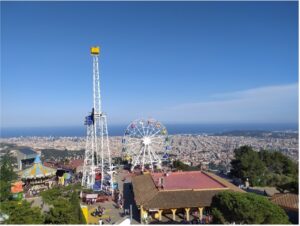
© Caroline Scherer
Besides the internship I enjoyed the time in Barcelona – it never gets boring because there is so much to see and to experience! I personally found it hard to get to know other people, mostly because I didn’t attend university classes on a regular basis and besides the doctoral student with whom I shared the office, the members of the research group were all a lot older than me. I used mobile apps to find people to meet up with, and eventually I got to know other students – some other internationals, but also Spanish people. I used the weekends to visit different places in Barcelona, sometimes alone and sometimes with friends. On Sundays I often went to museums because some of them can be visited for free on Sundays after 15 pm. Of course, I also went to the beach every once in a while, but especially on weekends the beaches in Barcelona are very crowded and I couldn’t enjoy them so much. If you have the time, better take a bus or train and visit a beach outside of the city! One sight-seeing highlight for me was a trip to Tibidabo, an amusement park up on a mountain at the edge of town. Even if you don’t wanna pay the entrance fee, you can still walk around parts of the area and enjoy the amazing view over the entire region!
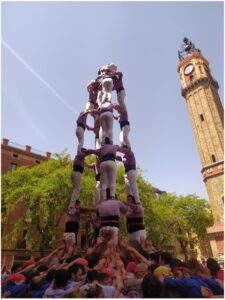
© Caroline Scherer
I had to adjust a bit to the life in Barcelona, for example it took me some time to get used to having dinner late in the evening. But one thing I really liked was that the city was always alive, and especially in the evenings I enjoyed to walk around the district because I loved the atmosphere when so many people were still outside enjoying food and drinks with their friends. If you’re interested in cultural activities, just keep your eyes open because there are many public events in all parts of the city, one day I went to a presentation of the Castelleros, for example. The weather was mostly really pleasant, especially in May, but since I have very fair skin, I had to be quite careful and I avoided to go outside around noon. But as I wrote before, you can really enjoy the evenings in Barcelona, so I didn’t feel like I missed out on much! In June it was very sunny and hot most days – I personally didn’t enjoy the heat much and was glad to return to Germany before it got even worse in July and August. But if you like sun and a hot climate, the summer in Barcelona is definitely perfect for you!
In summary, I enjoyed my internship in Barcelona, it was a great experience to live and work here for a while. I was a bit disappointed that I didn’t learn so much about research methods as I had hoped I would, but I learned many other things during my internship, improved my Spanish skills a lot, I discovered interesting places in Barcelona and made new friends!
Kategorie: Barcelona, Spain
No Comments »
My internship abroad in Barcelona
- Materialwissenschaft und Werkstofftechnik
- Spain, Barcelona
- BSport
- 01.03.2021-05.07.2021
Preparation
Preparation includes a few things such as funding opportunities from the university, whether you’d like to get the internship recognized (as a compulsory internship), finding an internship, finding accommodation, insurance. In general, it helped me to list everything and then decide which processes take the longest, such as documents from the university, because they’ll have to be signed by different parties, and then decide which things will have to be done first.
Finding an internship
When looking for an internship, I can recommend LinkedIn, as many offers are listed there clearly, or simply researching on the internet. In Spain, many things happen very quickly, so that there are often only two weeks between the application process and the first day of work. However, this depends on the size of the company.
Finding a flat
I can recommend spotahome for finding a flat. I found my flat here and was very satisfied. It is an agency that provides a lot of clear information about the flats, as well as video tours of almost all flats. In addition, if you don’t find everything as shown in the pictures, you can stay in a hotel at the agency’s expense until you find a new apartment.
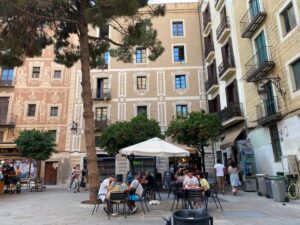
©Hanna Johannsen
This is very important, as there is a lot of fraud in Spain regarding flats. For this, you pay a fee of about 250€ for booking the flat via the website. If you are on site, you can look for flats on Idealista, for example, and drop by the flat and save the agency fee. One difference I noticed here is that you often don’t know who your flatmates are. In Germany, there are always a lot of “flatmates”-castings, whereas in Spain you often only talk to the agent/ landlord and then have to decide whether you want to move in.
Insurance
As far as insurance is concerned, I contacted my own insurance company in Germany, as they often offer discounted additional offers for insurance abroad. In my case, it was the “Envivas” insurance through TK. In Spain, you are generally insured with public doctors/hospitals via your normal insurance card, which is also the so-called “European Health Insurance Card”. However, both my friends and I have not had very good experiences with this and would therefore recommend taking such additional insurance anyway. This way you can go to all doctors and will only have to submit the bill to the insurance company for reimbursement afterwards. In Spain, I noticed a huge difference in services between public institutions and private doctors.
Formalities on site
Once you arrive in Spain, you have to take care of “El Padronimiento” and the “NIE” number. “El Padronimiento” is the registration in Spain and the “NIE” is the foreigner identification number. The NIE number gives you many advantages regarding public transport systems and makes things easier. For both things you have to make an appointment online. This is possible for the registration, but impossible for the NIE number. Regarding the NIE number, there are now a lot of agencies that have made this a business, which you unfortunately have to submit to sooner or later, because it is almost impossible to get an appointment here. In my particular case, I got a number from a guy through friends of friends. I had to send him my passport number and a few days later pick up the document which is required for the appointment in some shop and pay 40€ in cash. Sounds strange looking back, but you have little choice and almost everyone does it this way. In some cases, the company helps you with the NIE number. This is a good thing to ask for in the interview. Once you get the appointment you have to be very careful to have all the documents exactly as requested, otherwise you will be send home very quickly.
Actually, registration and the NIE number have to be done at the beginning, but I know some people who didn’t take care of it at all or only much later. For a short stay, I would consider it, as the effort is very high.
I would definitely recommend sorting this out before your stay abroad. Firstly, for the documents, which have to be printed out and complete, and secondly, it is sometimes possible to apply for the NIE number at the Spanish embassies in Germany. This makes the process much easier.
Means of transport
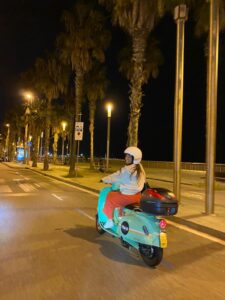
©Hanna Johannsen
The main way to get around Barcelona is by metro. The metro system is very good, cheap and efficient. I always bought a 10-trip ticket, which costs about €11 (as of 2021). With this ticket you can also use the bus. For a longer stay, I would recommend the three-month ticket, which costs 80€ (as of 2021) and is therefore very worthwhile. However, you need the NIE number for this. You also need the NIE number to register for the bicycle system in Barcelona.
Here you pay 50€ (as of 2021) for a whole year and can always ride your bike for free for the first half hour. E-bikes are also available at the bike stations scattered around the city. Everything is very cheap. Personally, I also really liked riding a scooter – there are apps like “YEGO” or “Seat Mo” that make it super easy to rent a scooter and ride it around the city.
I really enjoyed it and had no problems with the traffic in Barcelona. With a normal B license you can drive a 50cc scooter and if you have had your license for three years you can even drive a 150cc scooter in Spain.
Everyday life/ free time
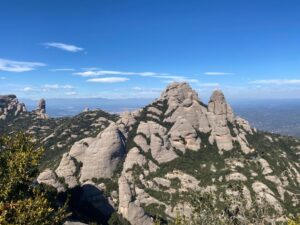
©Hanna Johannsen
The life in Barcelona is simply amazing.
There are so many things to do and something for everyone. The mountains are close by for cycling or hiking with unbelievably beautiful views. The beach and the sea are also close by.
The restaurant and nightlife culture gives the city such a nice atmosphere. I personally took dance lessons in Barcelona because there are also many good dance schools there.
In general, you were always in a good mood in Barcelona because the weather is so good, the architecture is so beautiful, and the city is so vivid. There is something exciting on every corner.
As for trips, I can recommend Montserrat, Mont-Rebei or Sitges.
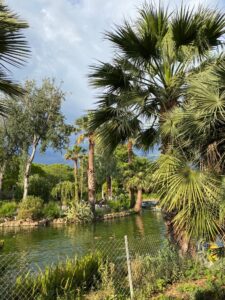
©Hanna Johannsen
The train system in Catalonia was very cheap and efficient. You can travel very well to cities further away for little money and thus explore the Barcelona area very well.
Advices
In general, I can only recommend requesting a reasonable contract for the internship. The rights as an employee/intern are far away from those in Germany. The internship contract is the only safety you’ll have and extremely important. Even if there may not be many internship alternatives or the boss is hesitant about it. A clear contract is very important.
Even if the department or the supervisor does not offer it, always ask for a feedback-talk. This can prevent misunderstandings and helps a lot to develop and learn from the internship.
Otherwise, I find that a lot of things develop naturally, with flatmates, friends or finding one’s interests in a new city. Here, I’ve learned to not want everything at once and to stress out if it’s not the case. Everything has its time and will work out.
For me, it was such a great experience, and I would go to Barcelona again any time and can also imagine moving there later.
Kategorie: Barcelona, Business Administration and Engineering, Materials and Process Engineering, Spain
1 Comment »
Kulturschock in Barcelona: Architekturpraktikum in Spanien
- Architecture M.Sc.
- Spain, Barcelona
- 01.03-31.08.2021
Wohnen:
Ich würde euch vorschlagen eine WG zu suchen, die nicht von einer Agentur ist. Die Kosten für ein Zimmer variieren je nach Zone, es lohnt sich deswegen ein bisschen außerhalb des Zentrums zu wohnen.
Praktikumssuche:
In Barcelona/Spanien, es ist schwer ein bezahltes Praktikum zu finden. Man muss nicht perfekt Spanisch sprechen.
Kulturschock:
Katalan! Sei vorbereitet nicht so viel Spanisch tu reden. Es wird tatsächlich viel auf Katalan gesprochen, und wenn nicht, dann können fast alle Englisch. Es war generell ziemlich entspannt, man hat aber diesen Druck immer etwas zu machen. Also, sei bereit viel mit Freunden zu machen.
Büro-Alltag:
Da wir fast nur junge Leute waren, hatten wir ein entspannter Alltag. Die Chefin hatte aber ein „spanisches“ Temperament und sprach manchmal sehr laut. Es ist normal, dass man viel Emotionen zeigt, während man spricht, also, auch zu dem Kulturschock, Spanisch kann sehr emotional sein, auch im Büro. Wir hatten eine 2 St. Pause, was man als Siesta kennt. Das hatte seine Vorteile, weil man auch etwas anderes erledigen kann.
Bank, Telefon und Versicherung:
Ich musste nichts besonderes machen. Die meisten Handyverträge gelten sowohl in Deutschland als auch für Spanien. Ich habe auch hier kein neues Bankkonto eröffnet, hat sich nicht gelohnt.
Alltag:
Strand, ja. Barceloneta, nein. Wenn möglich, nimm den R1 nach Norden, es lohnt sich da die Strände zu besuchen. Als erstes hol dir ein Fahrrad, du kannst überall erreichen, es ist ziemlich günstig (Wallapop App) und Barcelona bietet sehr schöne Fahrradspuren für Sicherheit und gute Anbindung.
Besondere Adressen, meiner Meinung nach:
Spelta Cafe in Gracia – Carrer de Maignon, 11, 08024 Barcelona
– Günsig und leckeres Essen, nimm Patatas bravas
Orxateria Verdu – Carrer del Bruc, 126, 08037 Barcelona
– Nimm Orxata, halb süß und halb pur
Bar Iberics Eixample – Carrer de la Diputació, 99, 08015 Barcelona
– Bester Jamón! Marcos ist nett und quatscht gerne mit allem, auch wenn er nicht Englisch spricht.
Kategorie: Architecture, Barcelona, Spain
1 Comment »
-
Recent Posts
Recent Comments
Archives
- January 2026
- September 2025
- August 2025
- July 2025
- April 2025
- March 2025
- February 2025
- January 2025
- December 2024
- November 2024
- May 2024
- April 2024
- March 2024
- February 2024
- January 2024
- December 2023
- November 2023
- October 2023
- September 2023
- August 2023
- July 2023
- June 2023
- February 2023
- January 2023
- December 2022
- November 2022
- October 2022
- August 2022
- July 2022
- June 2022
- May 2022
- April 2022
- March 2022
- February 2022
- December 2021
- November 2021
- October 2021
- September 2021
- August 2021
- July 2021
Categories
- Allgemein
- Amsterdam
- Applied Geography
- Applied Geophysics
- Architecture
- Athens
- Austria
- Bachelor
- Barcelona
- Beijing (Peking)
- Belgium
- Berkeley
- Bilbao
- Biology
- Biomedical Engineering
- Biotechnology
- Brackley
- Buisiness Economics
- Bulgaria
- Business Administration and Engineering
- Chemical Engineering
- Chemistry
- China
- Civil and Environmental Engineering
- Civil Engineering
- Computational Engineering Science
- Computer Science
- Construction and Robotics M.Sc.
- Copenhagen
- Corg
- Course of Study
- Cyprus
- Czechia
- Denmark
- Dublin
- Electrical Engineering
- Electrical Engineering and Information Technogoly
- Energy Engineering
- Engineering Geohazards
- Environmental Engineering
- Fagerstrand
- Finland
- France
- Göteborg
- Greece
- Helsinki
- Hospital
- Host Country
- Information Technology
- Internship
- Ireland
- Ischia
- Istanbul
- Italy
- Krakow
- Leuven
- Liechtenstein
- Literary and Linguistic Studies
- London
- Luxembourg
- Madrid
- Master
- Master Thesis
- Materials and Process Engineering
- Mechanical Engineering
- Medicine
- Milan
- Molecular and Applied Biotechnology (MA)
- Montpellier
- Netherlands
- Norway
- Oslo
- Other
- Oulu
- Paris
- PhD
- Philosophy
- Physics
- Poland
- Practical Year
- Prague
- Product Development
- Product Engineering
- PROMOS
- Psychology
- Research
- Research Stay
- Romania
- RWTH Research Ambassador Scholarship
- Sevilla
- Simulation Sciences M.Sc.
- Slovenia
- South Carolina
- Spain
- Stanford
- Sweden
- Teachers
- Toledo
- Tranås
- Tromso
- Trondheim
- Tsinghua
- Turkey
- United Kingdom
- United States of America
- Utrecht
- Valladoid
- Vienna
Meta

